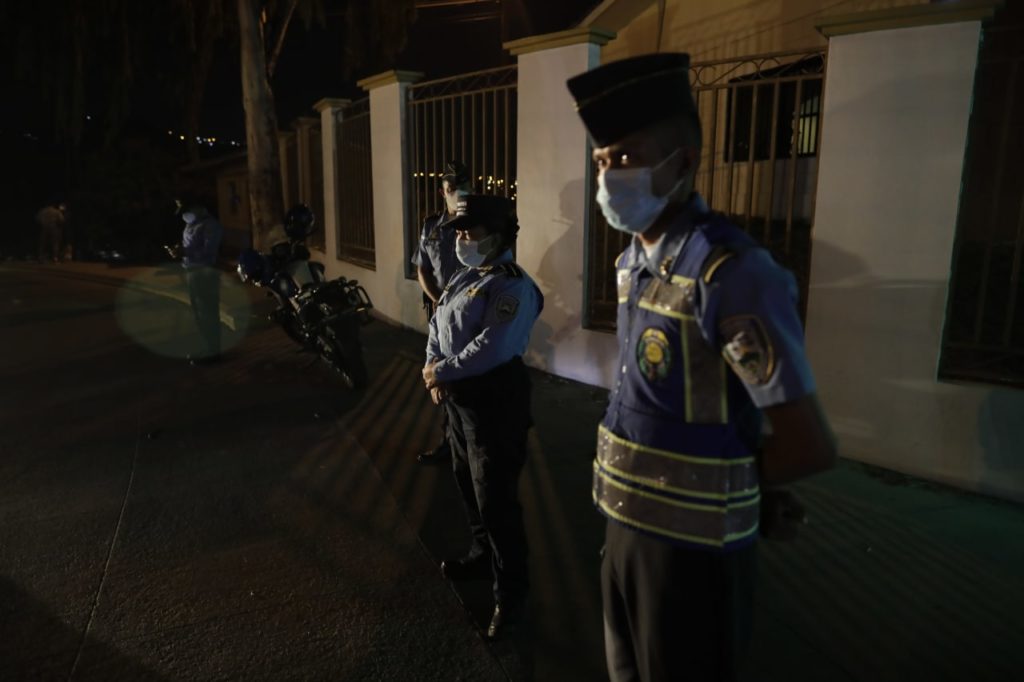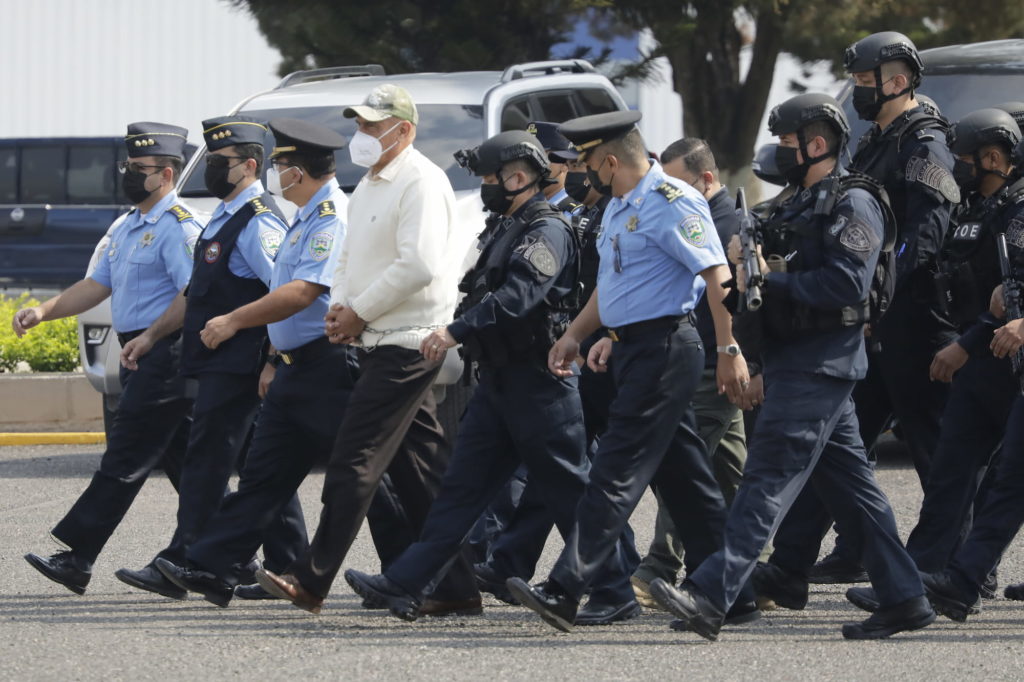In anticipation of the upcoming trial of former Honduran President Juan Orlando Hernandez on charges related to drug trafficking, Honduras is examining how organized crime affects the country. Additionally, it scrutinizes the implications of the relationship between the United States, the former president, and the process of purging the police force. To delve into these matters, Contracorriente held an XSpace entitled “Narco-state on Trial”, with writer and analyst Óscar Estrada as guest. Security Minister Gustavo Sanchez was in the audience and also participated in the discussion.
Text: Vienna Herrera
Photography: Jorge Cabrera
Translation: Amy Patricia Morales
Former President Juan Orlando Hernandez was detained for extradition exactly two years ago, and is now just days away from the start of a trial against him in the Southern District Court of New York for drug trafficking-related crimes. Two defendants who will stand trial alongside the former president recently pleaded guilty: Juan Carlos “El Tigre” Bonilla, former director of the Honduran National Police (PNH), and Mauricio Pineda, a former PNH officer and Hernandez’s cousin.
Oscar Estrada, a renowned analyst on the case, shed light on a disturbing reality: shady figures like Hernandez are intrinsically linked to institutional weakness. “These dark characters emerge when institutionality is weak, when the institutions that should protect us as a society, our political system, our judicial system, are not fulfilling their function,” he said.
Estrada described a vicious cycle in which political leaders, driven by an excessive lust for power, abuse laws and norms to stay in power, strengthen themselves and achieve their objectives. In his analysis, he directly linked the figure of Juan Orlando as a sequel to the 2009 coup d’état. He also reflected that, two years after the extradition, the country has not been able to move forward on a path that inspires confidence.
Gustavo Sánchez, Minister of Security, who also led the operations to capture Tigre Bonilla and the former president, said that “the process of purging Tigre Bonilla was to remove the competition, that must be said, it was to subdue the National Police so that they would not act. Are there some people linked [to organized crime] in the police institution? Of course there are, and we are working on that. We have removed 2,500 police officers so far during this administration,” he said, although he evaded questions about whether there is an internal purge of the police, how it is being carried out, and whether there are mechanisms for transparency in this regard.
In 2016, during Hernández’s administration, Honduras began a police purging process that had the support of the United States in multiple programs. However, Hernández’s relationship with the U.S. went beyond superficial support. There was a direct link from an ideological and religious agenda between Juan Orlando and Donald Trump, as revealed by Contracorriente in the collaborative investigation Transnationals of Faith. Currently, Hernandez’s defense is considering using this collaboration as one of the defense arguments.
For Estrada, the United States is largely responsible for how far Hernández has come, so during the trial two radically opposing narratives will be seen: “one in which Juan Orlando is what the prosecution says, the crown jewel of a drug trafficking structure that was installed over two decades; and on the other hand, Hernández is the person who managed, through his close relationship with the United States, with Israel and with US intelligence and security agencies, to reduce violence in our country,” he said.

A week before the extradition request was made public, Congressman Bob Menendez had sent a letter to the State Department asking that Hernandez’s visa be revoked and that he be sanctioned for being “a drug kingpin abroad.
Hernandez responded with a statement in which he recalled that the fight against drug trafficking from Honduras “has been supported by the US government, including Senator Menendez with whom he met in 2013 with the aim of pushing for extradition. In May 2013 you came to Honduras and asked me as president of the National Congress to push for Honduras to make the extraditions. Our results were being celebrated in Washington.
During his tenure, Hernandez repeatedly issued press conferences, television broadcasts and communiqués in which he appeared to alert the United States that there would be consequences if he was prosecuted. Estrada added that one of the direct consequences of the trial is that the United States will have to rethink its relationship with Latin America in its fight against drug trafficking. “I think that presidents who have had financing from drug trafficking in their campaigns are not going to want to continue cooperating in the same way with the United States,” he explained.
Consequences and Analysis of the Narco-State on Trial
Christian Sánchez, of the media Pro-Honduras Network, of Hondurans based in the United States, said that he is waiting for new co-conspirators who have not been participated in trials before, and “that they are going to be there and that all those who are going to be present at that trial are going to observe them in photographs, because that is what happens there,” he said. He emphasized that the press has a very important job, that of pointing out and investigating these actors.
One person in the audience pointed out that now, with a new Public Ministry, a new police and a new Supreme Court of Justice, these institutions should act immediately: “It is not possible that in the Armed Forces there are still members of the military who participated in drug trafficking and who remain free,” he said.
On February 9, the Public Prosecutor’s Office announced the dispatch of a group of Honduran prosecutors to witness the trial against the former president, “to give high priority to new investigations or expand the existing lines of investigation into cases of organized crime and drug trafficking,” says the statement, adding that they will proceed, if the case warrants, against individuals or companies mentioned in the trial.
However, the Public Prosecutor’s Office is currently in charge of an interim prosecutor who was elected under irregular conditions, after a permanent commission with 9 deputies, mostly from the ruling party, approved this motion until reaching a consensus to officially appoint authorities.
Recommended reading: Interim attorney general and deputy attorney general are sworn in by permanent commission amidst political conflict
Estrada added that in a context where the prosecutor’s office lacks legitimacy due to the way it was elected “what we are going to have then is an environment of politicization of the criminal prosecution system due to political interests, and that is very delicate, this dynamic does not help us as a society”, he said.
Moreover, individuals implicated in past trials include not only former officials and politicians from the National Party. Recently, the former deputy for the Libertad y Refundación (Libre) party, Rony Martínez, stated on his Twitter account that “there could be mentions of Honduran actors during the trials that have nothing to do with drug trafficking issues. “JOH and company intend to dirty them, for pure retaliation or revenge, beware,” he said.
Regarding this, Estrada warned that these types of responses from politicians can be ineffective, given the deep-rooted distrust of political leaders. “The Honduran population is open to believe anything they are told about Honduran politicians,” he said, and recalled that in Honduras we have witnessed how politicians have the capacity to manipulate the truth and lie through their teeth.
Estrada added that while it is true that the twelve years of the National Party government were critical in the emergence and strengthening of drug trafficking, the problem is not limited to the National Party alone, but affects the entire political spectrum of the country. He stressed that Honduran society is facing a critical moment in which transparency and accountability are urgent imperatives to restore confidence in the entire system.
For his part, Minister Sanchez, faced with the questioning of a citizenry that does not trust the National Police, of a country in a state of exception, with serious denunciations of human rights abuses, maintained that “the partial state of decision only affects criminals”, and pointed out that during the state of exception the PNH makes apprehensions, “but all this is later validated by the Public Prosecutor’s Office; They say that there are many complaints, I know that in the National Human Rights Commission (Conadeh) there are complaints, but in the courts and in the Public Prosecutor’s Office the complaints are minimal”.
It should be recalled that Conadeh reported in December 2023 that since the state of emergency began, they have dealt with an average of 33 complaints per month related to abuses by security agents against people’s human rights.
Sánchez added that both the Public Prosecutor’s Office and the National Police are dismissing and capturing justice operators from other institutions, “because the organized climate affected the institutionality of the State, we were very comfortable (…) A few weeks ago we captured ten police officers, seven for one incident and three for another, and we will continue to do so. We have cancelled 2,500 police officers, what we have not done is a circus, what we have not done is to expose them, what we have not done is to violate the constitutional guarantees that even the police officers have”, he affirmed.
He added that, in his opinion, the problem of violence and crime is not a police problem, but a social problem. “Honduras has three sources: one, common crime; two, organized crime; and the third is the cultural factors embedded in society,” and on the latter he gave as an example the case of when a man kills his partner.
At that moment, Jessica Sanchez, gender analyst, said that it is necessary that the Secretariat of Security recognizes femicides as such: “In the Latin American Protocol of violent deaths it says that while it is not investigated, while the investigative process is ongoing, it will be called femicides, right? In other words, every death of a woman is a femicide in the first instance (…) I don’t know why the resistance”, she pointed out.
Minister Sanchez said that the National Police acts according to the law. “Every time there is an incident the person who typifies the case is the prosecutor, he tells us if we analyze it as homicide, as murder, as patricide or as femicide (…) Unfortunately we live in a macho society, where it is seen as normal for a man to assault a woman,” he argued.
Jennifer Avila, editorial director of Contracorriente, stressed that violent deaths and femicides in Honduras are related to organized crime violence: “What happens is that men have more access to weapons or are part of organized crime, and there are also women who are being used by organized crime groups. We are in a country that is completely contaminated and to which we add a fundamental factor, which is impossible to ignore, which is machismo, and the death and violence that women face in general,” she said.
Finally, Estrada concluded by emphasizing that the lesson of this trial goes beyond understanding the structure of the narco-state. “How do we prevent drug money from continuing to filter into political campaigns that continue to elect narco-mayors, narco-deputies, narco-presidents?” he asked. The analyst warned that relying solely on US intervention is not seeing the big picture, especially since other social problems in Honduras, such as migration and femicides, are also intrinsically related to the situation that put former President Hernandez on trial: a narco-state.






